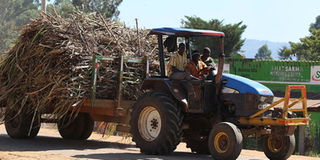Sugar has always been bitter for farmers

A tractor ferries sugarcane to Butali Sugar Factory in Kakamega County on August 12, 2018. PHOTO | FILE | NATION MEDIA GROUP
What you need to know:
- Muhoroni’s sudden halting for example in May left workers without pay since the year began and farmers unpaid over Sh400 million.
- The sugar directorate by 2011 estimated that six million Kenyans or 25 per cent of Kenya’s population derive their livelihoods from the industry.
Many people watched with horror as the National Assembly flushed down the report on importation of illegal and contaminated sugar into the country.
The co-chairman of the 36-member Joint Departmental Committees on Agriculture and Livestock, Trade and Cooperatives Kanini Kega was obviously left with a not so sweet taste on his tongue after the shameful still birth.
That has been the taste sugar has left in the mouths of thousands of farmers and employees over the years.
It is sweet for the traders but bitter for the farmers.
While traders of the commodity live large, farmers are steeped in debt and debilitating poverty.
Sugarcane mills slid into comma, with millions of debt to farmers and workers piled under their death beds.
SUGAR MILLS
Muhoroni’s sudden halting for example in May left workers without pay since the year began and farmers unpaid over Sh400 million.
The town remains a ghost town and insecurity has increased as cash flow becomes constrained in the sub-county which also has Chemelil Sugar, another on its knees.
Workers in Chemelil have kept my phone ringing with tales of how their children have been forced to chew cane around the factory as part of their meals after they exhausted the relief food meant for flood victims that they received in April and May.
Ironically, only those who put so much effort in this business are facing this odd situation.
For traders, the business is so sweet that when Treasury Cabinet Secretary Henry Rotich gave the unlimited gazette notice opening window for duty free imports last year, everyone rushed to make a kill. The price has since shot and business is booming.
Why is sugar trade so sweet?
POPULARITY
First, Kenyans love sugar. Latest data from the country’s sugar directorate show that each Kenyan needs at least 1.6 kilogrammes a month including children.
The high per capita demand is despite the fact that it is twice expensive to consume sugar in Kenya compared to the United States and Europe according to the National Sugar Supply and Demand report released in 2015.
It is the only commodity after maize that draws the attention of government so easily with traders always dangling it for trade favours.
The sugar directorate by 2011 estimated that six million Kenyans or 25 per cent of Kenya’s population derive their livelihoods from the industry making it a key economic engine in the rural areas to drive poverty reduction tool and a check on rural-urban migration.
CARTELS
Kenya’s sugar trade is also a highly cartel-clogged market, allowing traders to cut many corners and make a kill even when lives are endangered.
An Agriculture and Food Authority report also lists political influence as a key driver to illegal imports and cause for market distortion making it a jungle where traders play rough and care less.
Some traders get this sugar cheaply then sneak it into Kenya through informal cross-border trade, which poses unfair competition to the local sugar producers all while ensuring they have the lucrative margin.
Okoth is a Nation journalist.





